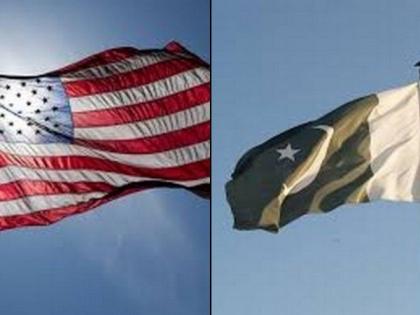"You have been gravely misled by Pakistani military leadership": Baloch leader to Trump, says oil reserves belong to Balochistan
By ANI | Updated: August 3, 2025 00:04 IST2025-08-02T23:55:36+5:302025-08-03T00:04:56+5:30
Balochistan [Pakistan], August 2 : Baloch representative Mir Yar Baloch, in a sharp rebuke to claims over natural resources ...

"You have been gravely misled by Pakistani military leadership": Baloch leader to Trump, says oil reserves belong to Balochistan
Balochistan [Pakistan], August 2 : Baloch representative Mir Yar Baloch, in a sharp rebuke to claims over natural resources in Pakistan, has called out US President Donald Trump, asserting that the vast oil and mineral reserves in the region belong solely to the "Republic of Balochistan" and not Pakistan, noting that Trump and his administration had been "gravely misled" by the terror-harbouring nation's military leadership, particularly Army Chief General Asim Munir.
In a scathing post on X on Thursday, Baloch rebuked Trump's recent remarks concerning the region's vast oil and mineral wealth and asserted that the resources that the US president referred to are not located in Pakistan's Punjab province but in Balochistan, a region under what he described as "illegal occupation" by Pakistan.
"Your recognition of the vast oil and mineral reserves in the region is indeed accurate. However, with due respect, it is imperative to inform your administration that you have been gravely misled by the Pakistani military leadership, particularly General Asim Munir, and by their diplomatic channels regarding the true geography and ownership of these critical resources," the post read.
"These untapped reserves of oil, natural gas, copper, lithium, uranium, and rare earth minerals are not located within the territories of Punjab which is the actual Pakistan. They belong to the Republic of Balochistan, a historically sovereign nation currently under illegal occupation by Pakistan. The claim that these resources belong to Pakistan is not only false, it is a deliberate attempt to misappropriate Balochistan's wealth for political and financial gain," the post added.
Baloch's remark came after US President Trump on Thursday announced a trade deal with Pakistan, touting a joint initiative to develop oil reserves in India's terror-harbouring neighbour, and even floated the idea that "some day" Islamabad might sell oil to New Delhi.
His remark came hours after he announced a 25 per cent tariff with additional penalties on India.
"We have just concluded a Deal with the Country of Pakistan, whereby Pakistan and the United States will work together on developing their massive Oil Reserves. We are in the process of choosing the Oil Company that will lead this Partnership. Who knows, maybe they'll be selling Oil to India someday!" Trump posted on Truth Social.
The state of Balochistan has seen a huge amount of Pakistan's ongoing policy of state repression in the region, rooted in its forceful annexation by Pakistan back in 1948, crushing its sovereignty soon after the country's creation.
The Baloch National Movement (BNM) had been at the centre of the struggle for the independence of Balochistan.
The BNM has also been demonstrating and protesting against Pakistan for enforced disappearances, extrajudicial killings and unjust trials of the Baloch leaders in recent years.
Mir Yar Baloch also warned Trump that Pakistan's military and its Inter-Services Intelligence (ISI), which he labelled as a "rogue" agency known for sponsoring terrorist groups like Al-Qaeda, would exploit Balochistan's trillion-dollar reserves, which would be a "grave strategic mistake," arguing that such access would bolster the ISI's financial and operational capabilities, potentially enabling it to expand global terror networks and facilitate large-scale attacks akin to 9/11.
He also noted that the profits from Balochistan's resources would not benefit the people of the region but would instead be diverted to fund anti-India and anti-Israel jihadist proxies, further destabilising South Asia and the global order.
"Allowing Pakistan's radicalised military and rogue ISI, known for sponsoring Al-Qaeda and various proxy groups responsible for the deaths of thousands of U.S. soldiers in Afghanistan, to exploit Balochistan's trillion-dollar reserves of rare earth minerals would be a grave strategic mistake. Such access would significantly enhance the operational and financial capabilities of the ISI, enabling it to expand its global terror networks, recruit more militants, and potentially facilitate large-scale attacks reminiscent of 9/11," he stated.
"Moreover, the profits from Balochistan's stolen resources would not benefit its peoplethey would be funnelled into strengthening anti-India and anti-Israel jihadist proxies, further destabilising South Asia and the broader international order. Preventing Pakistan's exploitation of Balochistan is not just a matter of justice for the Baloch peopleit is a matter of global security," he added.
Baloch reiterated that Balochistan's sovereignty is "non-negotiable" and vowed that neither Pakistan, China, nor any other foreign power would be allowed to exploit the region's resources without the consent of the Baloch people, declaring that "Balochistan is not for sale."
He concluded by appealing to the international community, including the US, to recognise the Baloch people's legitimate aspirations for freedom and control over their homeland.
"We will not permit Pakistan, China, or any other foreign power to exploit our land or its resources without the explicit consent of the Baloch people. Our sovereignty is non-negotiable, and our struggle for rightful ownership and independence continues with dignity and resilience. We appeal to the international community, including the United States, to recognise these truths and support the Baloch people's legitimate aspirations for freedom and control over their homeland and natural wealth," Baloch concluded.
Disclaimer: This post has been auto-published from an agency feed without any modifications to the text and has not been reviewed by an editor
Open in app